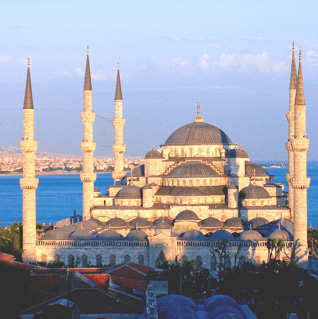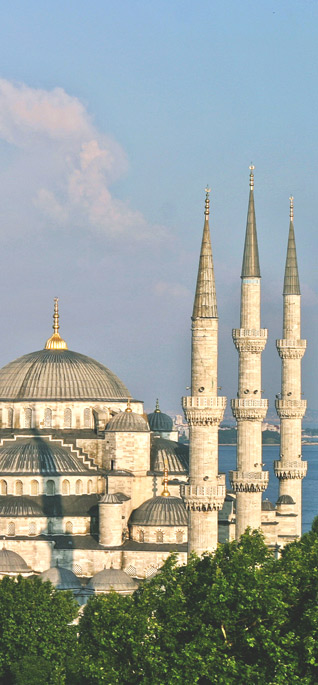Travel
In the Blue Mosque
T. SHER SINGH
DAILY FIX
Wednesday, October 10, 2012
It never ceases to amaze me … whenever, wherever I watch people worship in a congregation, how quickly their religion, their garb, their language, even the ritual, in fact all outward manifestations of their devotion, dissolve into insignificance.
Immersed in their complete surrender, even the object of their piety recedes: the prayer, the praying and the prayed, all become one.
I have felt the same emotions in the Monastery of the Tranfiguration on a precarious mountain-top in Meteora in northern Greece, engulfed in waves of Gregorian chants, as I have behind my childhood home in India, where the Hindu servants of the neighbourhood sang bhajans all night with a dholak and cymbals.
Amidst a thousand Jewish professionals at a banquet in the Royal York Hotel in downtown Toronto, as they prayed together, led by a cantor; and while listening to the ethereal kirtan sung before sunrise in the Darbar Sahib in Amritsar.
It is the act of worship that I find liberates me, when I find myself amongst worshippers, not the how or the why or the who of the worship.
My daughter, then 12, and I, were in Istanbul -- the very first of my many trips there, because it pulls me like no other city I know -- one summer.
We made a bee-line for the sprawling Sultanahmet Mosque -- more popularly known as the Blue Mosque -- on Friday, the day of the Muslim sabbath, having been told that more than 10,000 gather there every Friday afternoon for prayer.
The mosque dominates what may be the most beautiful skyline in the world. The main dome rises solemnly and the minarets -- uniquely, six of them! -- reach out skywards, like hands in obeisance.
We purposely arrived an hour early to beat the crowds, hoping to find a choice spot. We’d been warned that the hall would fill up within minutes at the appointed hour, and you won’t be able to get past the courtyard once the service begins.
We came prepared, of course, dressed in long sleeves and trousers. My daughter wore a scarf to cover her head.
At the approach of the hour, we saw tourists being told to leave the premises. We asked a mullah if we could stay for the service.
Are you Muslim, he asked. No, we aren’t, but we’d like to sit in. He was quiet and thoughtful for a few seconds, and then nodded his head.
Can my daughter also attend, I continued in a combination of broken Turkish and sign language. Yes, he said.
We chose a choice spot, a third of the way from the front, in the middle, under the majesty of the main dome. We sat down on the carpet, cross-legged, with our shoes off and neatly laid out beside us … imitating the others around us.
Within half-an-hour, people began to pour into the main hall from every direction. We could see shadows moving in the mezzanines and balconies that towered above us. The hall filled up quickly.
We looked around at the sea of humans and then the two of us looked at each other. My daughter’s face reflected my own emotions: a combination of pure elation and a large dose of terror. She didn’t have to put it into words: not only were we the only two non-Muslims around, as far as we could see, but she was the only female in an ocean of males!
If the path had been clear, we would’ve made a run for the exit. But we were trapped. We would have to be air-lifted to get out of there!
Suddenly, a young man who had been stepping around the seated figures as he headed in our direction, stopped right next to us and, surveying the field, concluded that there was no space in the vicinity. He looked down at me, and scowled. He gestured at my daughter, pointed to the back of the building and spat out a string of angry words.
We looked around. He was pointing to the far end of the hall -- a hundred yards away, it appeared - to an area in the shadows. It was an elevated platform, about two feet high, surrounded by a waist-high latticed partition. I focused my eyes and noticed a cluster of women sitting against the wall behind it.
I looked back at the man standing over us. He was gesticulating wildly; he wanted my daughter to move to the back.
We didn’t want to create a problem. My daughter anxiously tugged at my sleeve. I thought: oh well, it was worth a try.
We were about to get up, when another Turk -- seated a few spots away -- got up and walked over to where we were. The wizened old figure had a quick exchange of words with the young man. The latter threw up his hands and walked away, carving a path through a jumble of feet, knees and shoulders.
Another voice from nearby challenged the old man. He smiled back, and silenced him with a gentle show of his palms. He then squeezed himself a seat, right beside us. Stay put, he said in sign language, it’s all right, I‘m with you.
A moment later, he dug into his pocket and brought out a vial of attar.
[I knew what it was, having received gifts of it back in India. Specifically made without alcohol as an ingredient, these are perfumes used by Muslims the world over.]
I observed a ritual all around us: a touch of the cork on the wrist, and then offered to others beside you. Rubbed between the hands until the aroma filled the air.
The old man turned to me and offered to put it on my wrist. I smiled and asked him to put some on my daughter’s first. He recoiled. No, he indicated; not her; only for you. I put my hand over my heart and said, no, thank you. If she can’t, I indicated, then I won’t.
He didn’t look happy. A frown appeared. I could see the struggle in his eyes. Slowly, wearily, resignedly, he turned towards her and stretched out his hand. She offered her wrist. He touched it with his cork.
We all burst into smiles -- everyone, that is, who was watching this scene being enacted in mime. I thrust my wrist towards him.
The service began shortly.
A lone, melodious voice began the prayer.
Thousands of worshippers around us instantly became one, a sea of reverence. The Word moved them in unison, undulating with the sway of the Song.
My daughter and I sat there, perfectly still, entranced, enraptured, afloat in this gently breathing, bending, bowing ocean, at one with them all.
Amidst a sea of aliens. An alien religion. Alien customs. An alien language.
Alien?
At the end of the service, the old man warmly shook hands with me, and then disappeared into the crowd.
The two of us just stood there. Neither said a word.
We felt at home.
Conversation about this article
1: Harinder (Uttar Pradesh, India), October 10, 2012, 11:01 AM.
Quote: "...not only were we the only two non-Muslims around, as far as we could see, but she was the only female in an ocean of males ...!" Dear Sher ji, this need not have bothered you as you are protected by Waheguru's Khanda. You can go to any part of the universe and you will be welcomed and protected by the Waheguru who loves all his creation. This mass of people of sitting together and praying to God in a particular pose and direction is an interesting and enigmatic phenomenon. I do not know why and how this has become such a prominent part of Islam. I believe, Sher ji, with your travelogues you could become the modern day version of "Gulliver's Travels".
2: Harmit Kaur (Singapore), October 11, 2012, 1:23 AM.
Wow ... so beautiful.
3: John Joseph (New York, U.S.A.), October 13, 2012, 7:27 AM.
Interesting to read. It teaches one to look at things with a open mind. It is the "faith" in the people and "God", whoever and what ever -- that matters. AS Buddha says - be rational in your thoughts, just do not take it because some one told you so. Analyze all religious practices. Take what is reasonable, not what your parents told you or what your grant parents told you or taught you. They did their part to the best of their understanding -- but today the knowledge-base line is on a different level and we need to analyze things on that level. The religions teach good -- but the preachers have their own agenda.






